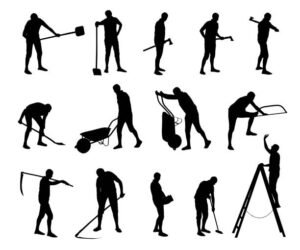Looking for a way to start working in the USA without years of experience or specialized skills? Whether you’re an international newcomer or a local seeking fresh opportunities, unskilled jobs offer a fast track to earning, gaining experience, and building your future. Let’s explore the top 10 unskilled jobs that can open doors for you today. My guide is intended for international workers seeking employment in the USA without advanced qualifications, as well as local job seekers aiming to enter entry-level positions that require little prior experience.
Advertisement
Understanding the Unskilled Jobs Market in the USA
The unskilled jobs market in the USA forms a critical backbone of the country’s workforce, supporting numerous industries that rely on labor-intensive, entry-level positions. These jobs, which typically require minimal formal education or specialized training, are often accessible to a wide range of workers including high school graduates, individuals re-entering the workforce, and international workers on appropriate visas.
Characteristics of the Unskilled Jobs Market
The unskilled jobs sector is characterized by a high volume of positions spread across various industries such as retail, hospitality, food service, warehousing, construction, and cleaning services. These roles often involve manual labor, routine tasks, or customer-facing duties that can be learned quickly with on-the-job training.
Because these jobs require less specialized skill sets, they tend to have lower barriers to entry. As a result, they provide vital employment opportunities for individuals with limited education, newcomers to the country, or those seeking flexible or part-time work.
Advertisement
Demand and Supply Dynamics
The demand for unskilled workers fluctuates based on economic conditions, consumer trends, and seasonal factors. For example, retail and hospitality sectors experience higher demand during holidays and tourist seasons, while construction and landscaping jobs may be more abundant in warmer months.
E-commerce growth has also spiked demand for warehouse and delivery workers, making logistics one of the fastest-growing areas for unskilled employment. Conversely, automation and technology adoption are gradually reshaping some unskilled roles, emphasizing the importance of adaptability and willingness to learn.
Wage and Working Conditions
Typically, unskilled jobs offer wages at or slightly above the federal or state minimum wage. While some positions provide opportunities for overtime and tips, many workers in this sector may face challenges related to job security, shift variability, and physical demands.
Working conditions vary widely from fast-paced retail floors and busy kitchens to outdoor landscaping sites and quiet office cleaning roles. Employers often provide safety training, but workers must remain vigilant about workplace hazards, especially in physically intensive jobs.
Opportunities for Advancement
Although labeled “unskilled,” these jobs can serve as stepping stones toward more skilled professions. Many employers invest in employee training programs and promote internally, offering motivated workers a chance to improve their skills, increase their income, and advance into supervisory or specialized roles.
For international workers, gaining experience in unskilled jobs can also open pathways to longer-term employment opportunities and visa sponsorship, particularly if combined with additional certifications or education.
Impact on the Economy and Society
The unskilled jobs market contributes significantly to the functioning of daily life and the broader economy. It ensures that essential services from retail transactions to healthcare support are maintained efficiently. Additionally, these jobs provide crucial income for millions of Americans and immigrants, supporting families and communities across the nation.
What Qualifies as an Unskilled Job?
Unskilled jobs are generally defined as roles that require minimal formal education or specialized training. These positions typically involve manual tasks or routine duties that can be learned quickly on the job.
Why Unskilled Jobs Are Important Entry Points for Many Workers
Unskilled jobs serve as vital entry points for individuals entering the workforce, including international workers and locals without extensive qualifications. These roles provide opportunities to gain work experience, earn income, and potentially progress to skilled positions over time.
Common Industries Employing Unskilled Workers
Industries such as retail, hospitality, manufacturing, warehousing, and landscaping commonly employ unskilled workers. These sectors depend heavily on unskilled labor to maintain daily operations.
Importance of These Jobs in the Economy
Unskilled jobs are essential to the economy, supporting supply chains, service industries, and infrastructure maintenance. They enable businesses to function smoothly and serve as a foundation for economic growth.

Eligibility and Work Authorization for International Workers
Visa Types Allowing Unskilled or Entry-Level Employment
Several visa categories permit unskilled or entry-level employment in the USA, including the H-2B visa for temporary non-agricultural workers, J-1 exchange visitor visa, and Optional Practical Training (OPT) for recent graduates. Eligibility depends on visa-specific criteria.
Work Permits and Documentation Required
Work authorization documents, such as Employment Authorization Documents (EAD) or specific visa endorsements, must be obtained before employment can commence. Employers often verify these documents to ensure legal compliance.
Challenges Faced by International Workers in Unskilled Sectors
International workers may face challenges such as limited visa availability, language barriers, cultural adjustment, and potential exploitation. Awareness of rights and access to support services are crucial for navigating these obstacles.
Top 10 Unskilled Jobs in the USA
1. Retail Sales Associate
Job Description and Duties
Retail sales associates are typically responsible for assisting customers, stocking shelves, processing transactions, and maintaining store cleanliness.
Typical Employers and Work Environments
Employment is often found in department stores, supermarkets, specialty shops, and large retail chains, with work environments varying from busy stores to quieter boutique settings.
Average Pay and Tips for Success
Hourly wages usually range from minimum wage to slightly above, depending on location and employer. Success is often achieved through strong customer service skills, punctuality, and a willingness to learn.
2. Food Service Worker (Waitstaff, Fast Food Crew)
Roles in Restaurants, Cafes, and Fast Food Chains
Food service workers perform tasks such as taking orders, preparing food, serving customers, and maintaining cleanliness in dining areas.
Skills Required and Career Progression Possibilities
Basic communication and teamwork skills are required. Advancement to supervisory roles or culinary training can be pursued with experience.
3. Warehouse Worker / Package Handler
Demand in Logistics and E-commerce
The rise of e-commerce has increased demand for warehouse workers who pick, pack, and ship products efficiently.
Physical Requirements and Shift Patterns
Physical stamina and the ability to stand for long periods are required. Shifts may include nights, weekends, or rotating schedules.
4. Janitor / Cleaner
Types of Facilities
Janitorial duties are performed in offices, schools, hospitals, hotels, and industrial sites, maintaining sanitation and order.
Typical Duties and Work Hours
Tasks include sweeping, mopping, trash removal, and restroom cleaning. Work hours may vary, often including evenings or early mornings.
5. Landscaping and Groundskeeping Worker
Seasonal vs. Year-Round Work
Landscaping work can be seasonal in colder regions but tends to be year-round in warmer climates.
Outdoor Work Conditions and Physical Demands
Work is performed outdoors and involves planting, mowing, trimming, and general upkeep of green spaces. Physical endurance and tolerance to weather conditions are necessary.
6. Home Health Aide / Personal Care Assistant (Entry Level)
Basic Caregiving Tasks
Basic caregiving duties, such as assisting with daily living activities, medication reminders, and companionship, are typically performed. Personal hygiene assistance and light housekeeping may also be required.
Certifications Sometimes Required but Minimal Training Needed
Although some states require certification or licensing, many entry-level positions provide on-the-job training. Certification programs can improve job prospects and earning potential.
7. Hotel Housekeeper
Responsibilities in Hospitality Industry
Housekeepers are responsible for cleaning guest rooms, replenishing supplies, and maintaining hygiene standards throughout hotels or motels.
Work Environment and Tips for Efficiency
Work is often physically demanding and performed on a strict schedule. Efficiency can be improved through systematic cleaning routines and effective time management.
8. Delivery Driver (Non-CDL)
Requirements for Light Vehicle Operation
A valid driver’s license and a clean driving record are generally required. A Commercial Driver’s License (CDL) is not necessary for many delivery roles involving smaller vehicles.
Delivery Jobs in Food, Parcels, and Local Goods
Deliveries of meals, packages, and retail goods are commonly handled. Familiarity with local routes and time management skills are valuable.
9. Construction Laborer
Role in Supporting Skilled Trades
Laborers assist with site preparation, material handling, and equipment operation under the supervision of skilled tradespeople.
Safety Considerations and Physical Demands
Strict adherence to safety protocols is mandatory. The work is physically demanding and often performed outdoors in varying weather conditions.
4.10. Call Center / Customer Service Representative (Entry Level)
Basic Communication and Computer Skills Required
Effective verbal communication and basic computer literacy are essential. Training is usually provided to familiarize workers with company-specific systems and protocols.
Typical Industries and Growth Potential
Customer service roles are found in telecommunications, finance, retail, and healthcare sectors. Advancement opportunities include supervisory positions and specialized support roles.
Tips for Landing and Thriving in Unskilled Jobs
How to Build a Strong Resume Without Formal Experience
Emphasis should be placed on transferable skills such as punctuality, teamwork, and reliability. Volunteer work, internships, and short-term projects can be highlighted.
Importance of Punctuality, Reliability, and Attitude
Employers highly value consistent attendance, dependability, and a positive work ethic, which often outweigh formal qualifications in unskilled roles.
Using Job Portals and Staffing Agencies
Online job boards and staffing agencies can be leveraged to access numerous job openings. Registering with multiple platforms increases visibility.
Opportunities for Training and Career Advancement
Many employers offer on-the-job training programs, allowing workers to gain skills that can lead to higher-paying positions or specialized roles.
Challenges and Opportunities in Unskilled Jobs
Common Challenges
Physical strain, job insecurity, and relatively low wages are typical obstacles faced by unskilled workers. Shift work and irregular hours may also affect work-life balance.
How to Navigate Language Barriers and Cultural Differences
Language training and cultural orientation programs can aid integration. Peer support and workplace mentoring are valuable resources.
Potential Pathways for Skill Development and Moving Up
Entry-level positions often serve as stepping stones. Through additional training, certifications, or education, workers can transition into skilled trades or supervisory roles.
Frequently Asked Questions (FAQs)
Q1: Can international workers apply for unskilled jobs in the USA?
A: Yes, but eligibility depends on visa status and work authorization.
Q2: Are unskilled jobs well-paid?
A: While entry-level wages are generally modest, some sectors and locations offer competitive pay and overtime.
Q3: Is prior experience necessary for unskilled jobs?
A: Most unskilled jobs do not require prior experience; on-the-job training is commonly provided.
Q4: How can career advancement be achieved from an unskilled position?
A: Gaining new skills, certifications, and demonstrating strong work performance can open advancement opportunities.
Q5: What resources are available to help find unskilled jobs?
A: Job portals, staffing agencies, community organizations, and government employment programs offer assistance.

Conclusion
Unskilled jobs play a crucial role in the American labor market, providing accessible employment opportunities for both local and international workers. By understanding the types of available positions, eligibility requirements, and strategies for success, individuals can effectively navigate the job market and build a foundation for future growth. While challenges exist, the potential for career advancement and skill development makes these roles a valuable starting point for many seeking to establish themselves in the USA workforce.




















I am looking for a way to get a job in usa